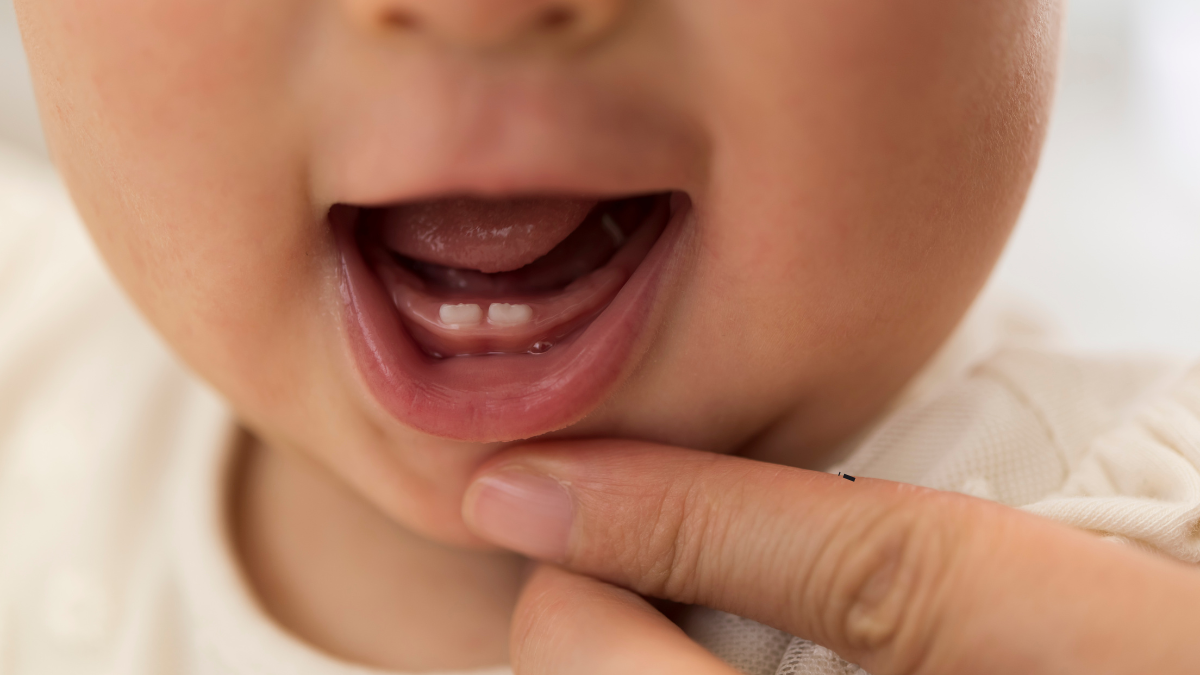As parents, we are all very attentive to our children’s every sound and voice, from cooing to crying and screaming.
But what if your child snores? While it may sound unusual at first, baby snoring is a relatively common issue for young children, so you shouldn’t be too concerned right away.
On the other hand, sometimes snoring may be a sign of an underlying problem that you should look out for.

What to Know About Baby Snoring
The term “snoring” refers to the condition when airflow is partially obstructed, and certain muscles in the throat vibrate, producing a loud sound as you sleep.
While snoring is a relatively common problem for adults, it may be alarming for a baby. Baby snoring is a common condition in infants, often noticed by parents at some point.
While it is generally not a cause for concern, it is always good to understand when the snoring is normal and natural, and when you should pay more attention to your child’s health. Let us help you with this matter by sharing everything you need to know about baby snoring.
What Is Baby Snoring?
Snoring in a baby has a similar nature to snoring in adults. However, the breathing patterns, airway sizes, and even positions while sleeping are completely different, which changes the way snoring sounds.
Parents are usually very surprised to hear their child snoring; however, it is not an uncommon occurrence. Baby snoring might be heard as a soft, gentle noise that your child makes during deep sleep, or louder, more regular snoring can occur. In general, snoring in babies is far more common than parents might think, and it is usually not a problem.
Signs of Snoring in Babies
Snoring in infants is quite common and not usually a sign of a problem. However, it is essential to know the signs to differentiate between harmless snoring and breathing difficulties or problems that may accompany it. Parents can notice several signs of snoring in their babies:
Occasional Snoring
It is no big deal when your child snores during one sleep after a long day full of activity or events. The cause is probably the vibration of the airways while your child breathes. It may even be their way of adjusting to sleep if the snoring is not loud or long.
Related: How to Help Your Baby Sleep Better
Snoring with Other Symptoms
Snoring alone is not a cause for alarm. However, when it is accompanied by other signals, such as labored breathing, long pauses, or when your baby has problems breathing during sleep, this is a reason to contact a doctor.
Snoring Every Night
If your baby snores every night, or a few nights per week, it may signal an obstruction in their airways or some other health issue. When a baby snores due to a cold, allergies, or an infection, it is temporary and should pass in a few days. If the snoring is regular and constant, it is best to keep an eye on your child.
Related: Nightmares and Night Terrors in Babies: Causes and What to Do
Changes in Sleep Patterns
Sleep is an essential part of a baby’s health and development. If you see signs that your child’s sleep patterns or quality have changed, it is worth giving it more attention. Your baby’s sleep should be deep and peaceful, and they should not wake often at night or be unable to calm down and fall asleep.
Excessive Sleepiness
Snoring in a baby with excessive sleep or constant tiredness and irritability during the day can be a symptom that your child has breathing issues at night. If this sleepiness and tiredness are very high, it is worth taking your child to the doctor.
Related: 5 Signs Your Baby Is Ready To Stop Napping
Causes of Baby Snoring
Snoring is usually harmless and does not pose any health problems or risks to your child. However, the following are the most common causes of snoring in a baby:
Nasal Congestion
The most common reason why a child snores is nasal congestion, especially if this congestion is associated with common colds or allergies. Nasal passages in babies are small and delicate, so they can become blocked and lead to snoring as the child is forced to breathe through a partly closed nose.
Sleep Position
Babies also usually snore when they sleep on their backs, as gravity pulls down the tongue and soft tissues in the throat and airway, leading to snoring. This is a temporary condition and can be easily fixed by repositioning your baby to one of the other sides.
Enlarged Adenoids or Tonsils
Enlarged adenoids or tonsils are very common in babies and children and are a common cause of snoring. As your child’s immune system is not yet fully developed, enlarged adenoids or tonsils are one of the ways your baby’s body can fight viruses or allergens. Enlarged adenoids or tonsils obstruct air passages in the throat and lead to snoring.
Related: 10 Symptoms Of Egg Allergy In Babies
Sleep Apnea
Sleep apnea is a more serious cause of snoring. When sleep apnea occurs, the child’s airway is partially or completely blocked during sleep, leading to pauses in breathing. Although it is much more common in adults, it can also occur in babies and should not be ignored.
Obesity
In some rare cases, obese babies, or babies with too much fat in the neck area, can start to snore. The extra tissue in the throat can cause airways to be obstructed and result in snoring. However, this problem is quite rare in babies and is usually seen in older children.
Premature Birth
Premature babies may also snore due to early birth, which did not allow their respiratory systems to fully develop. In some cases, this snoring can be a sign of a health issue in premature babies and must be carefully monitored.
Allergies
Allergies in babies also often lead to snoring. Allergies cause inflammation in the nasal passage and lead to partial obstruction of nasal passages. If you see that your baby often snores at specific times of the year or after exposure to an allergen, the problem may be caused by allergies.
When Should You Worry About Baby Snoring?
Baby snoring is usually harmless and should not be a reason to panic. However, some of the most dangerous and concerning health risks can be signified by your child’s snoring:
Chronic or Loud Snoring
If your baby snores loudly and often, it can be a sign of airway obstruction or enlarged tonsils or adenoids. If your child snores chronically, it is important to see a doctor and ensure there are no underlying issues.
Pauses in Breathing
The most concerning sign in your baby’s snoring is pauses in their breathing. It can be a sign of a serious condition called obstructive sleep apnea. If your baby experiences pauses in their breathing while sleeping, it is essential to seek medical attention.
Labored Breathing
If you see that your child is struggling to breathe while sleeping or snoring, and their chest is rising and falling dramatically, this could be a sign of a blockage or respiratory distress. This condition is also dangerous and must be seen by a doctor.
Daytime Fatigue or Irritability
If your baby is very tired and sleepy during the day, or seems much more tired or cranky, even when they are getting enough sleep, it may be because they are not sleeping well during the night due to snoring or breathing issues. In this case, you should consider taking them to the doctor.
Related: Infant Strabismus: Symptoms, Causes, and Remedies
Snoring After a Cold or Illness
If your child starts snoring after being sick or having a respiratory illness, it may be a sign of congestion or inflammation that needs to be addressed by a medical professional.
How Can You Help Your Baby with Snoring?
There are several ways you can help your baby with their snoring. If the snoring is a result of mild congestion or sleep position, the following are some ways you can reduce snoring in your child:
Use a Humidifier
A humidifier can add moisture to the air, which can loosen congestion and make it easier for your child to breathe at night.
Keep Baby’s Head Elevated
If possible, it is a good idea to elevate the head of your child’s crib or bassinet, which can help prevent airway obstruction. However, you must ensure that it is still within the safety regulations for child cots and bassinets.
Clear Nasal Passages
You can use saline drops and a nasal aspirator to help clear your child’s nose. This will make it easier for them to breathe during the night.
Change Sleep Positions
Sometimes repositioning your child can help their snoring, especially if it is only present in one position.
Consult a Pediatrician
If your child’s snoring is persistent or getting worse, you should take them to see a pediatrician. A doctor will help you find the cause of your baby’s snoring and treat it. Sometimes, snoring in a child is a symptom of a more serious condition, such as sleep apnea, or enlarged adenoids or tonsils, which need to be treated by a doctor.
Final Thoughts
Snoring in a baby is a common issue that can be both harmless and a sign of more serious health problems.
Usually, it is just a part of normal sleeping for a child, but sometimes, if accompanied by other symptoms, it may be a sign of a more serious underlying problem. If you have noticed your baby is snoring and are concerned about it, we advise you to keep an eye on your baby.
Try to monitor if their sleep is accompanied by any of the red flags we have mentioned above, and in the case of concern, do not hesitate to contact your baby’s pediatrician for further advice. We hope that with the information we have provided, you are better able to understand the issue, help your baby, and ensure that they get the restful, healthy sleep they need to grow and thrive.
Save pin for later

- 8th Month Pregnancy Care: What To Expect, Dos And Don’ts - January 17, 2026
- 80 Beautiful Hispanic Girl Names for Your Baby - January 8, 2026
- 7 Physical Signs Your Baby Still Isn’t Ready to Come Out - November 28, 2025



